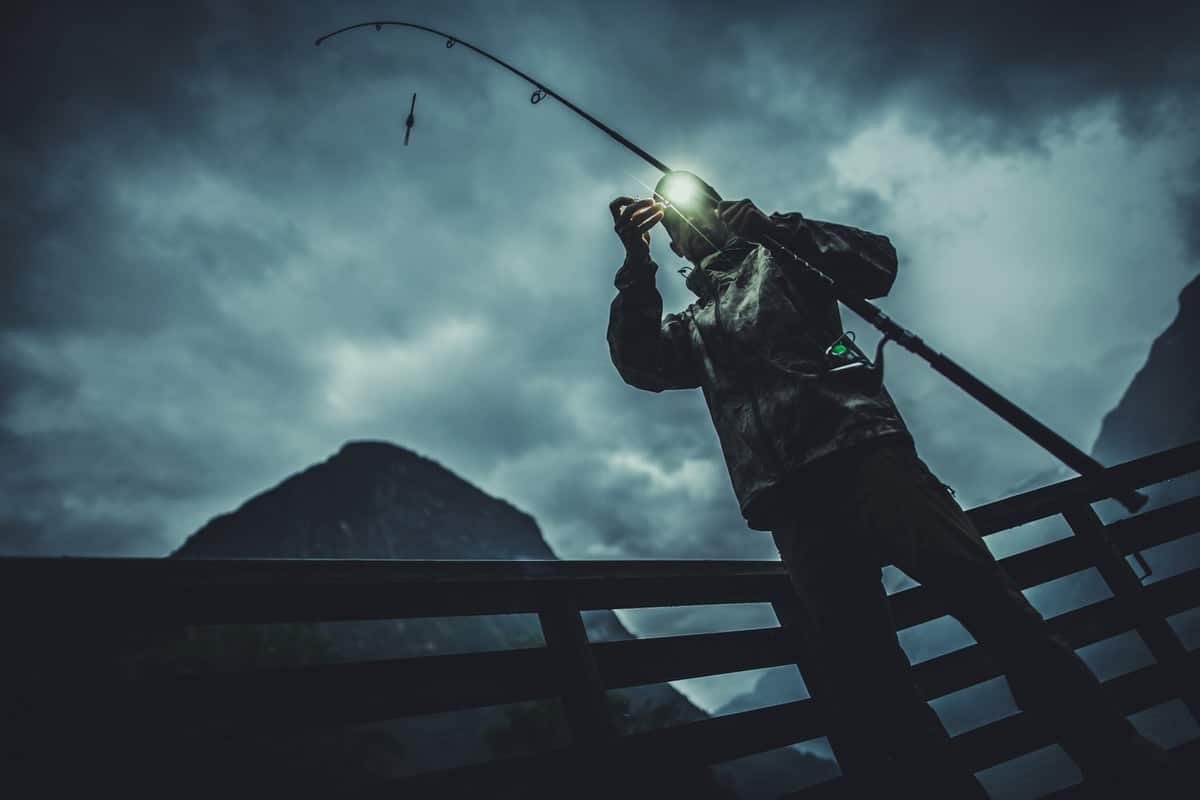
When it comes to fishing, most people choose to go during the day, unaware of night-time fishing benefits. Not only does night-time fishing opens up new possibilities and ways of fishing, but it can actually improve your fishing game.
Night-time fishing helps improve your fishing skills in many ways, such as:
- You must learn how to read the water without sight
- It gives you a better understanding of fishes’ habits
- You are forced to learn how to feel activity on the rod and rely on your other senses
Although an increased fish activity rate is enough of a benefit, fishing at night is also much more comfortable for humans. There is no risk of getting a sunburn, you save a couple of bucks by not paying for the pier, and there are fewer people around, which means less competition. We’ll cover all of that as well as other important info you need for night fishing.
How Night Fishing Improves Your Skills
Nighttime fishing is an excellent way to force yourself to learn skills that will otherwise come in handy during daytime fishing. Here are just a few ways that fishing at night helps up your fishing game in general.

You Learn How to Read the Water
Humans are sight-based hunters, meaning we have developed an amazing vision for hunting prey. However, when this is taken away, you’ll discover that you actually have very developed senses of hearing and touch, as well–both key factors for successfully fishing at night.
With enough practice, you can learn how to read the water based on how your bait or lure reacts, sensing obstacles like:
- Submerged structures, like fallen trees, large boulders, or overhangs
- The flow and current of the water as it drags your bait
- The depth of the water and its variations
You’ll find that with enough practice, your brain starts to piece this information together, creating a “map” of the underground environment. This is a skill that will help you in any fishing situation–not just after dark.
You Learn How To Feel Fish Activity Without Seeing It
One of the strange things about humans is how our senses adapt and react to the environment. When you spend enough time out in the dark, your sense of touch can actually become magnified, mostly because there is less information from your other senses to drown it out.
The consequence of this is that fishing at night helps you hone your sense of touch and learn how to pay attention to it. Without sight, you are forced to feel how the fish is interacting with your bait, and you have no visual indicators to fall back on.
You’ll learn to tell the difference between a disinterested nibble and a real tug feels, how a hungry predatory fish testing bait feels, and possibly even how different fish feel on the line before they even fully take the bait. All of that skill will transfer into every fishing trip you take.
It Gives You a Better Understanding of Fish Habits
Like any creature, fish are not static. They can have very different habits depending on the time of day, weather, and all sorts of other environmental factors.
Going fishing at night opens you up to an entire new world of fish behavior. You’ll quickly learn things like:
- How certain predatory fish become more active and aggressive, while others (especially sight based hunters) may become more sluggish
- How prey fish are going to school tighter and tighter around structures and their nests
- The way in which using artificial light can trigger certain behaviors in fish
Essentially, you are going to be forced to adapt and learn to a new world. The tricks and habits you are used to in the daytime may not cut it, and any time you need to adapt and overcome a new challenge will only make you a better fisherman.
Why Fish Tend to Be More Active at Night-Time
An important skill you gain from nighttime fishing is a better understanding of fish and their habits. You will learn how they act and why they act certain ways, this will help in future fishing trips.
It might come as a shock, but a lot of species of fish are most active at night. Fish, depending on the species, fall into different categories concerning their sleeping habits. These categories are:
- Diurnal: fish which have a similar schedule to humans, active during the day and resting at night
- Crepuscular: fish who are most active at dawn and dusk
- Nocturnal: fish that go on the prowl at night and “sleep” during the day
Even though there are different categories of fish, many of them are still active at night for a few reasons:
- There are cooler temperatures at night, especially during the hot summer days. Most fish swim deeper to find cooler waters during the day; however, they swim back up once the sun has set.
- A full moon can also cause some fish to remain active at night since there is still enough light for them to hunt.
- Other land-based predators are also less active at night–another good incentive for fish to be braver and come up towards the surface.
Success in nighttime fishing relies a fair amount on knowing the fish in that environment. The above information is a good summary, but it will always depend on your local ecosystem.
Is It Better to Fish at Night or During the Day?
There is no right or wrong answer to this question. It all depends on what type of fish you want to catch, the season, and most importantly, personal preference. Read on to learn more about nighttime fishing and see if it works for you.
What Is the Best Time to Fish at Night?
There are mixed opinions on what is the best time to fish at night, some say dusk while others claim it is twilight. No matter what time you are going, it is advisable to arrive at sunset to set up all your equipment to avoid stumbling around in the dark.
It is best to go ahead of time and scope out the area to make sure you are in a safe area and avoid any injury. However, once you are set up and out of harm’s way, the darkness will be a key factor in your training. You will have to learn to use your other senses to feel the water, the line, and most importantly, the fish.
When it comes to nocturnal fishing there is no exact best time. If you are angling for a specific fish, then it is best to learn their schedules and fish at their most active hours. Otherwise, most hours of the night are created equal.
Using Light to Help Attract Fish
One technique that can help maximize your chances of hooking on to a fish is using a fish light attractor. These devices can either be placed above the water or in the water to attract fish.
The light itself is not what attracts the fish. These led lights draw tiny microscopic organisms, phytoplankton. These tiny organisms start a natural food chain effect by attracting the fish.
Fish light attractors come in different shapes and sizes. Some can be attached to a dock, while others can be dangled in the water. Both perform the same way and are guaranteed to improve your fishing haul for certain species.
Are Glow in The Dark Lures Worth It
The fish light attractor theory would make sense for glow in the dark lures to also work. While theoretically good, glow in the dark lures is not always effective because the light they give off can be harsh and unnatural, which scares off certain fish.
One way to curb this issue is to find a lure that has a gentler, more natural glow, but this is also not certain. Glow in the dark lures can be a good investment, but the fish light attractors are usually more effective.
There is not enough research to say with certainty whether fish strike reliably at glowing lures. You will have to either decide that for yourself by trying it out or ask your fishing buddies to see what their experience with them is.
What Did We Learn?
Nighttime fishing has been one of the best-kept secrets of the community, with many being unaware of the countless advantages it can bring. However, before embarking on this new adventure, you need to keep in mind a few things.
Although fish tend to be more active at night, that is not always the case. Depending on the season, the location, and the type of fish you are trying to catch, nocturnal fishing trips might not be as successful as you would expect.
Even if your nocturnal fishing trips are not as successful as you would have liked, you will still learn many useful skills that are sure to make your future fishing trips a success!
Happy Fishing and Tight Lines!
